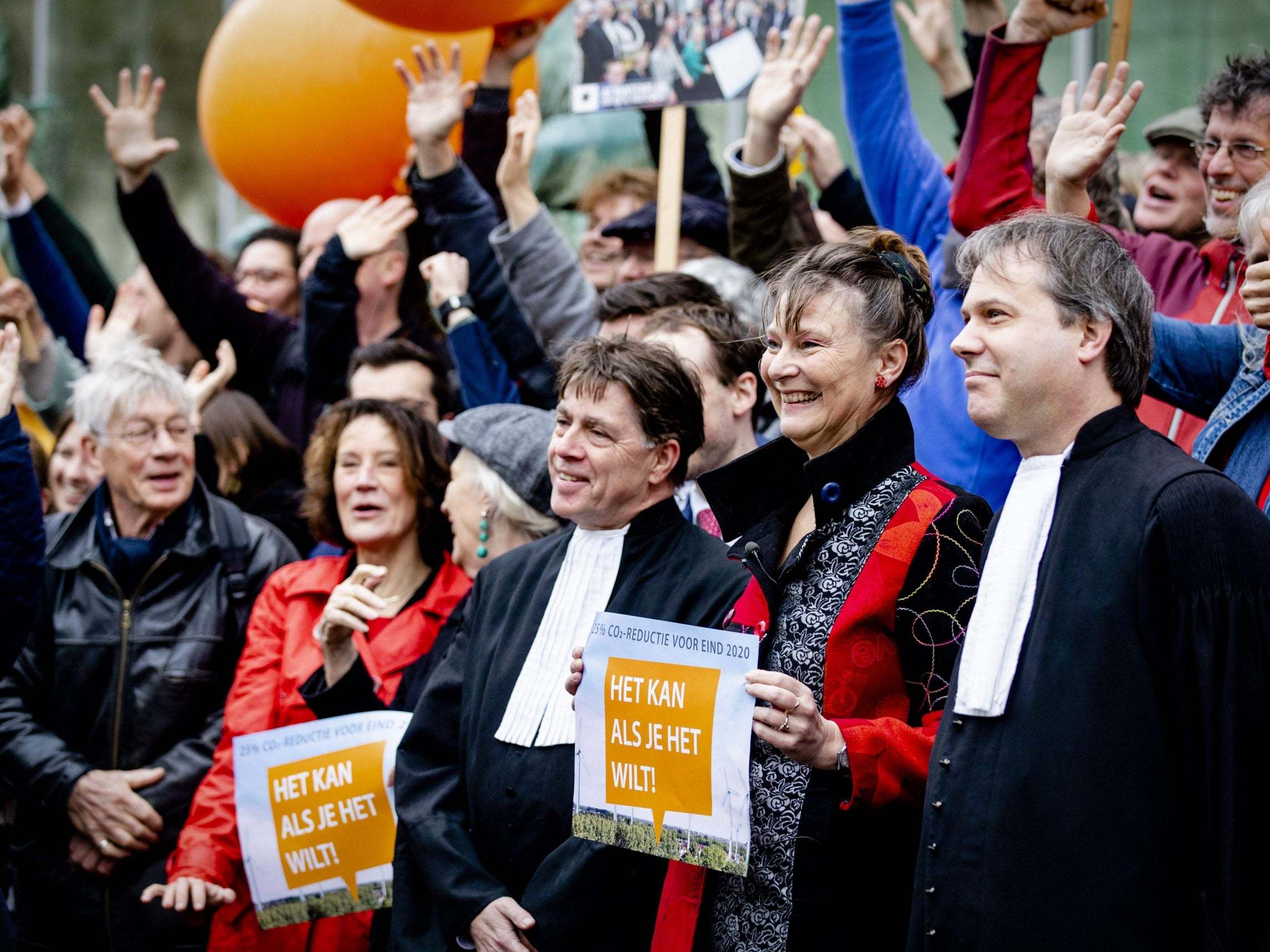Landmark ruling that Holland must cut emissions to protect citizens from climate change upheld by supreme court
Decision ‘provides a clear path forward for concerned individuals to undertake climate litigation’

The highest court in the Netherlands has upheld a landmark ruling that defines protection from the devastation of climate change as a human right and requires the government to set more ambitious targets to cut greenhouse gas emissions as a result.
Hailed as an “immense victory for climate justice”, the supreme court rejected the government’s appeal against earlier rulings, handing environmental activists a final victory in a gruelling six-year legal battle.
The Dutch government will now have to cut emissions by at least 25 per cent by the end of 2020 from benchmark 1990 levels.
“This is the most important climate change court decision in the world so far, confirming that human rights are jeopardised by the climate emergency and that wealthy nations are legally obligated to achieve rapid and substantial emission reductions,” said the UN’s special rapporteur on human rights and the environment, Dr David Boyd.
Dutch prime minister Mark Rutte said he guaranteed his government would do everything it could to reach 2020 target, without elaborating on possible measures.
“It’s complicated,” said Mr Rutte. “We have to close the remaining gap in a very short time.”
It is now more than four years since a court in The Hague first ordered emissions to be cut in a case brought by Dutch organisation Urgenda, which spawned similar legal challenges in courts around the world.
The government appealed that verdict, saying that courts should not be able to order the government to take action. The government lost the appeal in October 2018, but appealed again, this time to the supreme court.
Friday’s ruling rejected that appeal, saying the Dutch government must act “on account of the risk of dangerous climate change that could also have a serious impact on the rights to life and well-being of residents of the Netherlands.”
“Those consequences are happening already,” Justice Kees Streefkerk, the chief justice, said in the decision.
The court found that, based on the European Convention on Human Rights, the government had a legal duty to protect its citizens from climate breakdown, and should shape policy accordingly.
Experts said this paved the way for activists in all 47 member states on the Council of Europe to use the courts to ensure their governments took appropriate measures to prevent climate breakdown.
“This landmark ruling provides a clear path forward for concerned individuals in Europe — and around the world — to undertake climate litigation in order to protect human rights, and I pay tribute to the civil society groups which initiated this action,” said the UN’s high commissioner for human rights, Michelle Bachelet.
The 2015 ruling was the first anywhere in the world ordering a government to curb emissions, and of 1,442 climate lawsuits around the world, Friday’s “was the strongest decision ever”, Michael Gerrard, director Columbia University’s Sabin Center for Climate Change Law told the New York Times.
There have since been lawsuits in countries ranging from South Africa to Germany, with mixed results.
Earlier this month, three German farming families said they won’t appeal a court’s decision to dismiss their climate change lawsuit against Angela Merkel’s government.

On Thursday, Swiss authorities announced that environmental activists had collected enough signatures to force a referendum on setting specific goals for combating climate change in the Swiss constitution.
In light of Holland’s ruling, Greenpeace said the government would now have to step up action to cut emissions, with Faiza Oulahsen the organisation’s Dutch branch hailing it “an immense victory for climate justice.”
Earlier this year, the Dutch government announced what it called a climate agreement — a raft of measures intended to cut emissions by 49 per cent by 2030. But it appears unlikely the action already underway will be enough to meet the goal set by the courts in the Urgenda case.
A report by the country’s Environmental Assessment Agency published last month estimated that Dutch greenhouse gas emissions in 2020 would be about 23 per cent lower than 1990 levels. The agency said the reduction could be anywhere from 19 to 26 per cent.
But Urgenda director Marjan Minnesma was sceptical about those projections, saying they were “very, very, very optimistic”.
“Measures now will have to be drastic and the government owes that entirely to itself, because this verdict has not been taken seriously by Prime Minister Rutte for four years,” Ms Oulahsen said.
Ms Minnesma said the problem of climate change is already clearly visible — citing the wildfires raging in Australia as an example — and things like risings seas pose a very real threat to the low-lying Netherlands.
“Our country is to a large extent below sea level, so at a certain point in time if it goes as quickly as it goes right now, you might have a serious problem here,” she said.
Additional reporting by AP
Join our commenting forum
Join thought-provoking conversations, follow other Independent readers and see their replies
Comments
Bookmark popover
Removed from bookmarks